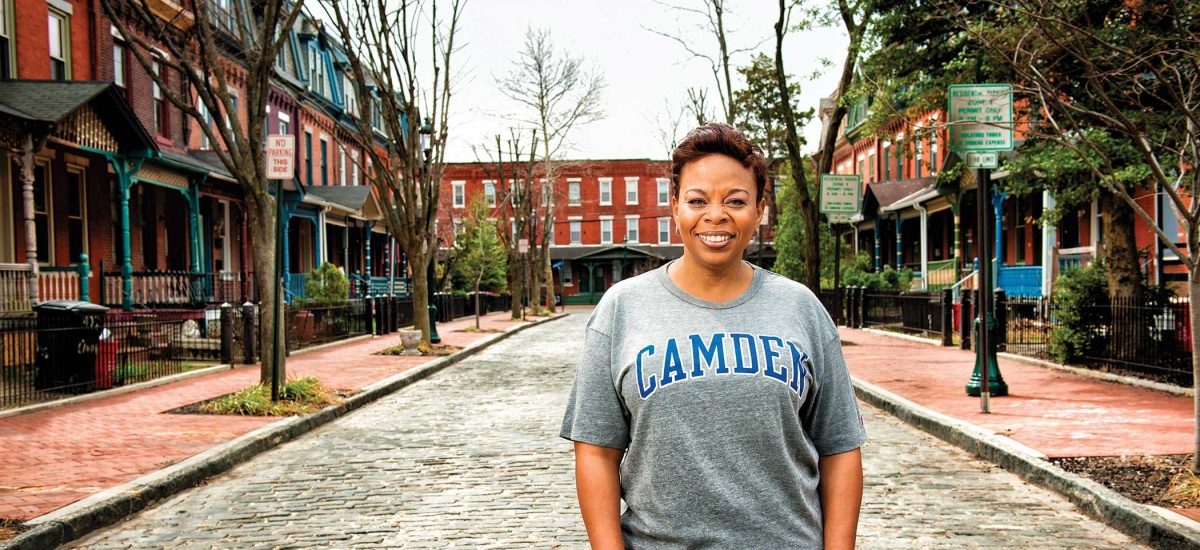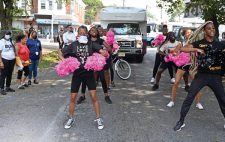Talk to Dana Redd – mayor of the city “Rolling Stone” recently called Apocalypse, New Jersey – and she will say with a smile that she’s “just Dana.” But truth is, she’s a commanding woman who’s not afraid to make tough decisions, like lay off nearly half of her crime-ridden town’s police department.
Redd has taken on the monumental task of rebuilding Camden because of a letter she received when she was only 8 years old, written by her late father.
He urged her to do something remarkable in Camden, to bring back the city he loved dearly. Considering the impact of his appeal, she may possibly be the one person who really can change Camden.
The making of Mayor Dana Redd is a story that begins with tragedy. At age 8, Redd was told of the deaths – some say murders – of both her parents. During a short vacation, their bodies were found in a hotel room, and no one can say exactly what happened, although police reported a murder/suicide. Redd’s mother had worked at Cooper Hospital. Her father led one of the largest unions at Campbell Soup Company and had made a failed run for a seat on Camden’s City Council. The married couple was devoted to the city where they were raising Redd and her younger brother in a simple row home.
“It made me grow up quick. The world became very serious to me,” says Redd, now 47.
While her parents had been away, Redd received a hand-written note mailed to her by her father. “My father believed so much in Camden that he encouraged us not to leave, because Camden was going to come back.
This was in the ’70s, during the days of Mayor [Angelo] Errichetti. They had begun to re-imagine, to have a vision for Camden. My father fell in love with the city and he somehow passed that on to his daughter, not knowing that ultimately I was going to become mayor. I was just looking at his picture this morning. It’s an honor to continue his legacy.”
Redd and her brother did stay in Camden, being raised by their maternal grandmother, Hazel Peoples. “I made a commitment that my brother – who was seven years younger than I – that we would not get separated, that I would look out for him and care for him, and I did. My brother and I are very close, even now.
“My grandmother raised me in church, raised me with a strong foundation in faith. Numerous community members took an interest in nurturing my brother and I, so I have a number of mentors who helped raise me. I am definitely the product of the village.”

Mayor Redd helps out at a playground re-build
That village is Camden, where today the overall crime rate is five times the national average, and the median income has steadily declined, reaching an all-time low of just over $21,000 in 2011, according to the U.S. Census Bureau. It wasn’t always that way, Redd notes. She grew up in a Camden that is worlds away from today’s version. So the vision Redd holds for the city’s transformation isn’t something she’s dreamed up. She’s lived it.
“When I was growing up in the mid-70s, there was a strong sense of community. Parents coached Little League teams. Our mothers worked with young ladies to be the cheerleaders of many of those Little League teams. We could play outside freely with never a thought of someone firing a gun or worry about a stray bullet. We could make mud pies or play with Barbie dolls, things little children do. Safety was never a concern for us.
“But the world has changed on so many fronts,” she continues. “I’m always looking for ways to make Camden a safer place for our children to grow and thrive. I love to hear their laughter. The day we made the transition to a metro police force – on May 1, 2013 – the last sound I heard at roughly 9:30-10 o’clock at night was the laughter of children at play. I was sitting on my couch, and I could hear kids outside giggling. For some reason that has stayed with me. I thought, ‘Wow, that’s such a profound sound for me.’ It was symbolic in so many ways.”
The elimination of the Camden City police department and the move to a county-run force was one of Redd’s most controversial decisions, she admits without hesitation. At the beginning of 2011, the city laid off 335 workers, including 167 police officers and 68 firefighters, after union negotiations failed. Critics said Camden was doomed and criticized the mayor for not doing more.
“I can tell you that we had exhausted every possible option in union negotiations,” she says. “Heading into 2011, we were spending an enormous amount of time in this room negotiating with police and fire unions. They just refused to give any concessions in spite of all the paperwork we generated for them – we would put a dollar value to what they were requesting, and a body value as well, and unfortunately, they decided to run the clock ’til January 18. By state law, I’m obligated to present a balanced budget, so we had layoffs. It was a challenging day for Camden when the layoffs occurred, because it went national.”
“I saw the personal impact that had on her – it was very difficult,” says Camden County Police Chief Scott Thomson. “When the city had to lay people off, I know from my interactions with the mayor that she lost many nights of sleep over that. She made tough decisions that were not very popular. Many others before her kicked the can down the road, and she was left in a position of having to do things that were undesirable but in the best interest for the city. The transition from the city police department to the metro division was a very arduous and difficult task with tight timelines, but it was all done with the ultimate interest of increasing the quality of life and public safety for the residents of the city.”
Camden County Freeholder Director Lou Cappelli Jr. also worked closely with Redd during the transition. “She was key. Without her leadership, the city never would have agreed to embark on this endeavor,” he says. “I think there were times when she feared for her own safety, but she put the residents’ interests first.
“This is something that’s never been done before in the state of New Jersey. She was the first mayor to engage in this process. It was quite an ordeal for us, quite frankly. But so far, it’s been as successful as it could be. We still have a long way to go, but certainly, the tide has turned.”
Crime rates for the first quarter of 2014 show a significant drop when compared to the same time period in 2013. The number of violent crimes decreased from 398 to 304, and car robberies were almost halved, according to county police data. Thomson and Cappelli are quick to note those strides were made without the metro division being at full force. Just 320 of its 400 planned officers now patrol the streets.
“We’ll add 75 more in June when they complete academy training,” says Thomson. “You have to put things in perspective. The size of that academy class alone is the size of three or four police departments in our state combined.” (Despite his role as chief, Thomson chooses to be one of the officers patrolling the streets on foot. “I’ve been a cop in the city for more than two decades, and I’ve never stopped patrolling the streets,” he says. “It’s my daily reminder of why I do what I do every day.”)
With Redd’s assistance, the new force has been armed with $3.5 million in space-age technology that almost lets them be everywhere and see everything. More than 120 street corners have eye-in-the-sky cameras monitored 24 hours a day in police headquarters. It’s called virtual patrols. And mini-microphones that send an audio signal when a gunshot is fired have been placed in high-crime areas. The audio is immediately replayed in police headquarters so officers can determine how many shots were fired and by what type of weapon. Any nearby cameras automatically turn in that direction, and police are given the exact GPS location. “So before anyone calls 911, we already have officers en-route,” says Thomson.
Redd was able to fund the new technologies by thinking a little outside the box to secure state and federal grants. “The final piece of funding came through the governor’s office,” says Redd. “It was $750,000 to fill a budget gap, so we could move forward with the camera installation. We were able to complete that project once all the funding programs were in place, somewhere around the end of 2011 going into 2012.”
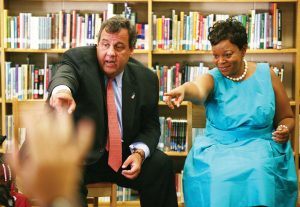
Governor Christie and Mayor Redd call on students at an elementary school in Camden
Redd also aimed her safety initiatives at schools, working closely with state-appointed superintendent of schools Paymon Rouhanifard to establish the Safe Corridor Program, which creates safe routes for children walking to schools.
“When I first got here,” says Rouhanifard, “we did a survey of students and staff, and we had a near 100-percent response rate from students. Half of our elementary school students said they didn’t feel safe, and 80 percent of middle and high school students didn’t feel safe going to and from school. So that was a no-brainer for us to address right out of the gate.”
“We instituted – I should say, reconstituted – the Safe Corridors Program. I say reconstituted because it was an initiative that was actually approved by City Council in 2004, and like many other initiatives in Camden, it went through a lot of fits and starts, and nothing really came together. We took a logical and practical idea, and reconstituted it. I did it in collaboration with Mayor Redd and Chief Thomson. It’s very much operational today.”
Rouhanifard sees his relationship with the mayor as a collaborative partnership. “She initially stood with the governor when they announced the state intervention in Camden, and then again stood next to the governor, the commissioner and myself when I was appointed,” says Rouhanifard, who began his work in Camden last August. “At the bare minimum, we’re talking every single week, but we’re talking almost every single day. It’s a relationship I very much value.
“One of the first things that struck me about Camden is the city has a mayor who’s willing to make tough decisions for the best interests of children. And sure enough, as soon as I got here, her actions have certainly backed up her words. She can take what is, essentially, an unpopular position, and communicate to the local community that this is an important change for us, and one we should all embrace. That’s leadership you don’t often see within the municipalities.”
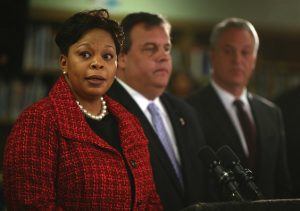
Mayor Redd, Governor Christie and Commissioner of Education Chris Cerf announce the state takeover of Camden schools in March 2013
One of those unpopular decisions occurred when Redd stood with Gov. Christie as he announced the state takeover of Camden’s public schools. “It probably was not politically smart,” Redd says, “but I stood with the governor last year for a full state intervention because 23 of our 26 public schools were performing in the lowest 5 percent in the state. I recognized that if our children are not doing well in school, if they are dropping out or are becoming truant, everything we are trying to build up will not be sustained unless we prepare the children of the city to be able to either go to college or to go into a career.
“I was blessed – although my circumstances were challenging at best because of my parents – my grandmother held a high value to education, so the thought of dropping out was non-negotiable. She pushed me to not only graduate high school, but to become the first generation in my family to graduate from college. It took me 10 years to do that because I worked during the day and went to school at night, but I didn’t stop until I got my bachelor’s degree.
“I know similar stories reside in Camden among our youth,” Redd adds. “That’s why we have to reform public education to meet the needs of our children. It’s not a system we abandon, and whoever is left behind is left behind. We have to look at portfolio management and look at giving parents options of education for their children. It’s raising the bar and level of expectation for our public education system.”
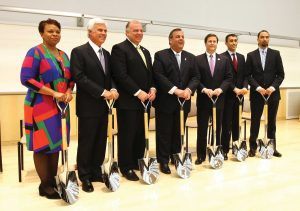
Groundbreaking for the KIPP Cooper Norcross Academy at Lanning Square: Mayor Dana Redd, KIPP Chairman George Norcross III, State Senate President Steve Sweeney, Governor Chris Christie, State Senator Donald Norcross, Superintendent of Schools Paymon Rouhanifard and KIPP Executive Director Drew Martin
A few months ago, Redd helped break ground on the new KIPP Cooper Norcross Academy in Lanning Square section of Camden. The school will be the first of three planned “renaissance schools” for the city, opening in a temporary space for 100 kindergarten students next fall and eventually moving to a 110,000-square-foot school a year later. Under the 2011 Urban Hope Act, Camden can open a total of five new renaissance schools, which are operated by nonprofits and supported by the city school district.
“It’s open enrollment, not a lottery,” says Redd. “The children in the catchment area of Lanning Square will have first preference and then children from the entire city will have access. It’s a wonderful opportunity for our children.”
Redd says much of the work she does is to improve the quality of life for the children of Camden. “I want our children to learn the importance of education, for them to become lifelong learners, not only to finish high school, but certainly to go on to college and strive for their masters degrees and PhDs if they so desire,” Redd says. “I want them to know that with hard work, anything is possible and life will present challenges and adversity, but you can overcome them all.
“I was recently at a school program led by two children who spoke of their aspirations for the future. The one little girl wanted to be in law enforcement, and it just so happened that my detail that day was a female officer. I said, ‘Well my detective is here today, I’d like you to meet her. She’s a female.’ And she was like, ‘Really!?’ I have a picture of the two of them. It was a moment I’ll never forget. It is fantastic to show young people that they can achieve their goals.”
Redd continues to work toward her extraordinary goals for Camden. As she begins her second mayoral term, she does acknowledge this job could become her life’s work. “There are no term limits in Camden,” she says, “so depending on what’s at stake for the city and the political environment, I’ve given thought to continuing here. The stars are aligned for Camden, and this is a great opportunity for us to work hard for the city. Change in Camden has been talked about for so many years, but now you actually see things happening.”
Q&A with the Mayor
How do you handle people who are always fighting against you?
I call them the energy vampires. I don’t let them become my distraction.
Do you ever think transforming Camden is too big a task?
My immediate response is no, because I love Camden. I think the possibilities for Camden are endless.
Who do you go to for advice?
My chief of staff, Novella Starks Hinsen. She’s 69; she’ll be 70 this year. She does not tell me what I want to hear, but what I need to hear. I need that truth-teller in my life. Leaders who have the bobble heads around them are not good; you need other folks so you can have a robust discussion.
Why do you think so few women are elected officials?
Women wait to be asked to run, which is very interesting when compared to males, who feel entitled to leadership positions. We try to encourage women, because they have something to contribute to policy discussions. Women get involved in politics to save the world. Men tend to get involved for the money.
Do you check your own email?
Yes, I will do my last round somewhere about 7 or 8 at night, so I’ll be done by 10. Then I check again first thing in the morning around 7, sometimes 6:30 if I’m up earlier. I have three email accounts.
How do you unwind at the end of the day?
I’m having difficulty turning my mind off lately, because I’m working on so many things. I’ve learned to work on balance a little more this year. I have to schedule quiet time, because if I don’t, it won’t happen.
How do you want to be remembered?
As an agent of change.
Have you faced hurdles in politics because you’re a woman?
There’s always a glass ceiling. I think all women deal with that, but I have developed professional relationships with my male counterparts where they respect me as a female leader. They also respect my ideals and my commitment to the city.
Do you think you’ve had to prove yourself more than if you were a man?
Without question. I’m a double minority. I’m black and a female, so absolutely I had to work harder and longer hours to prove myself.
When you walk outside, does everyone come up to you and talk about what they need?
It depends. Some will just say, “Hey, Mayor Redd!” Others tell me they’re looking for a job or whatever the issue may be. That’s what I’m here for. We’re public servants.
Do you have a social life?
Being a female in politics, you’re held to a higher standard. So I have girlfriends who I hang out with, and they’ve been my support system. They bring me balance and laughter.
Was last year’s re-election easy?
It was challenging. I don’t take any election for granted. We worked hard. We got out there; we knocked on doors. I love the engagement with our citizens and hearing their thoughts. They’ll tell me what I’m doing well and what I could be doing better.
What were some of those conversations like?
Folks were excited about the new metro force. Other residents talked about abandoned buildings that needed to be demolished, and I’m really excited that we’re about to take down close to 500 vacant structures that are unsafe. I also heard from citizens on ways we could better improve our communities.
Do you think there’s anyone better than you to be mayor of Camden?
God will determine that. I have pledged to give my heart to Camden, to give the best I have to make our city a better place to live in and that comes with a lot of personal sacrifice, particularly sacrificing family time, but I’m very, very committed to this job. I do not want to disappoint my citizens who depend on me and have supported me. I owe much to this generation and past generations, because they really have helped define and make me who I am.
What is your vision for Camden?
My vision for Camden is to have a city where communities are thriving, and we have places that our citizens are proud to call home.
What do you say to the people who take advantage of Camden?
Enough is enough. If you’re really serious about helping the residents of Camden, I believe in teaching a person how to fish so they can take care of themselves and their families as opposed to always giving fish – that does not teach personal responsibility.


